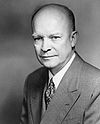Percival Brundage
Percival Brundage | |
|---|---|
| 12th Director of the Bureau of the Budget | |
| In office April 2, 1956 – March 17, 1958 | |
| President | Dwight D. Eisenhower |
| Preceded by | Rowland Hughes |
| Succeeded by | Maurice Stans |
| Personal details | |
| Born | Percival Flack Brundage April 2, 1892 Amsterdam, New York, U.S. |
| Died | July 16, 1979 (aged 87) Ridgewood, New Jersey, U.S. |
| Political party | Republican |
| Education | Harvard University (BA) |
Percival Flack Brundage (April 2, 1892[1] – July 16, 1979[2]) was an American accountant who served as the director of the United States Office of Management and Budget from April 2, 1956, until March 17, 1958.
Early years
[edit]Brundage was born on 2 April 1892 in Amsterdam, New York, the son of Unitarian minister the Rev. William Milton Brundage.[3]
Career
[edit]Before entering government service, Brundage was an accountant since 1914,[4] and a senior partner at Price Waterhouse & Co.[5] Brundage was appointed as deputy director when Rowland Hughes was appointed director in May 1954.[6] President Eisenhower appointed Brundage as director from 2 April 1956 (his 64th birthday[1]), following Hughes' resignation.[5] He resigned from the post on 13 March 1956.[7] In 1955, Brundage was elected to the Accounting Hall of Fame.[8]
Boards and charity work
[edit]Brundage was president of the National Bureau of Economic Research[5] and president of the American Institute of Accountants.[7] He was also Treasurer for the People to People Health Foundation,[9] as well as director of the American Unitarian Association.[10]
Personal life
[edit]In 1918, Brundage married Amittai Ostrander and had a son (Robert Percival) and a daughter (Lois Ammittai), and 4 grandchildren.[1] Brundage was an amateur artist who exhibited paintings at the Century Club in New York.[1]
References
[edit]- ^ a b c d Marjorie Dent Candee, ed. (1958). Current Biography yearbook. Vol. 18. H. W. Wilson Company. pp. 81–82. Retrieved 9 March 2010.
- ^ Yearbook. New York: Century Association. 1980. p. 216. Retrieved 9 March 2010.
- ^ Schoenebaum, Eleanora W.; Levine, Michael L (1976). Political profiles. Political Profiles: The Eisenhower Years. Vol. 2. Facts on File. ISBN 978-0-87196-452-6. Retrieved 9 March 2010.
- ^ "Another Budget Buster". The Pittsburgh Press. E.W. Scripps Company. 21 April 1956. p. 6. Retrieved 9 March 2010.
- ^ a b c "Hughes resigns as Director of Budget". Lewiston Daily Sun. James R. Costello Sr. 21 January 1956. p. 3. Retrieved 9 March 2010.
- ^ "Appointment With the President". The New York Times. 30 May 1954. Section: MAGAZINE, Page SM12. Retrieved 9 March 2010.
- ^ a b "Budget Chief Brundage Resigns Job". St. Petersburg Times. Times Publishing Company. 14 March 1956. pp. 1, 3.
- ^ "Hall of Fame: 1954 to 1956". Fisher College of Business. Retrieved 9 March 2010.
- ^ "Film On Hope's Progress To Be Shown At Breakers". Palm Beach Daily News. Cox Enterprises. 26 March 1961. p. 1. Retrieved 9 March 2010.
- ^ Clarence Kirshman Streit, ed. (1955). Freedom & union. Vol. 10–11. Federal Union (US). pp. 8–9. Retrieved 9 March 2010.


